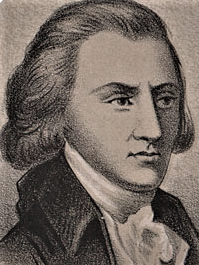James Smith was born in Ireland in 1719. He spent his formative years in Ireland, arriving in Pennsylvania between the ages of ten to twelve. James’ father was a humble farmer but was able to put James through an average education from a local Church Minister. As James grew older, he started to take interest in the law. Through his hard work, James was admitted to the Pennsylvania Bar at the age of twenty-six. He set up his practice in Cumberland County, near Shippensburg. However, business was slow in Cumberland County, so, after four years James made the choice to move to the more populated New York. During the 1760s Smith joined the local Whig party, quickly rising to leadership.
As relations with Great Britain deteriorated, Smith emerged as an advocate of ideas that would soon come to define the new nation. For example, in 1774, he attended a provincial assembly where he offered a paper titled: “Essay on the Constitutional Power of Great Britain over the Colonies in America.” James recognized the purchasing power of the colonies and sought to leverage that against the British. As such, his paper spoke on a boycott of British goods. Mercantilism had built Great Britain into an empire and James Smith wanted mercantilism to do the same for the colonies. He saw Parliament’s policies as stifling to colonial trade. The paper advocated for a boycott because Smith believed a boycott would force Parliament to acquiesce to colonial demands by applying pressure to the British economy.
The paper also spoke on a more independent version of the colonies, promoting the idea of a General Congress of the Colonies. The best way to protect one’s rights is to be in charge of them, to keep them as a bundle of sticks in one’s own bag. These ideas would become major points in the First Continental Congress adjourned in Philadelphia in the Fall of 1774.
Always the leader, James Smith then went on to organize a volunteer militia company in New York. Earning the respect of his men, he was elected as Captain. Smith was also a great recruiter, growing the company into a battalion. He understood the concept of the price of freedom. He also understood the age-old truth that the pen is mightier than the sword. James Smith would pass leadership of the militia to younger men so that he could focus on rallying the young nation around the ideas of freedom and self-determination.
While still serving the state assembly in 1775, Smith made a name for himself as a supporter of the causes of American freedom which now appeared to be possible only by separation. Thomas Paine’s articles in Common Sense began to turn public opinion to the idea of independency. The Second Continental Congress had been meeting in Philadelphia since May 10, 1775. Soon after, the colonies would raise their own army, appointing George Washington as its General.
James Smith was appointed to the provincial convention in Philadelphia in 1775, then the state constitutional convention in 1776, and eventually was elected to the Continental Congress the same year. Smith was in Congress for only two years, retiring in 1777. He then served in a few public offices: one term in the State assembly, a few months as a judge of the state High Court of Appeals. In 1782, Smith was appointed Brigadier General of the Pennsylvania militia. He was reelected to Congress in 1785, but declined to attend due to growing old in age.
However, a fire destroyed his office and papers shortly before he passed away. Because of this incident, not much is known about James Smith’s work. The result is that historians study Smith not through his journals, but through his actions. And his act of bravely signing the Declaration of Independence shows the world that James Smith believed that all men are created equal and are endowed with certain unalienable rights.
 Ertis Tereziu came to America as a child, and he possesses a background that gives him a unique appreciation for the United States system of government. Ertis is currently an attorney at Novara Tesija Catenacci McDonald & Baas, where he loves getting lost in the law. Connect with Ertis on LinkedIn at ertistereziu.
Ertis Tereziu came to America as a child, and he possesses a background that gives him a unique appreciation for the United States system of government. Ertis is currently an attorney at Novara Tesija Catenacci McDonald & Baas, where he loves getting lost in the law. Connect with Ertis on LinkedIn at ertistereziu.
Podcast by Maureen Quinn.
Sources:
- https://www.archives.gov/founding-docs/declaration-transcript
- https://www.ushistory.org/declaration/signers/smith.html
- https://www.dsdi1776.com/james-smith/
Click Here To Sign up for the Daily Essay From Our 2021 90-Day Study: Our Lives, Our Fortunes & Our Sacred Honor
Click Here To View the Schedule of Topics From Our 2021 90-Day Study: Our Lives, Our Fortunes & Our Sacred Honor

